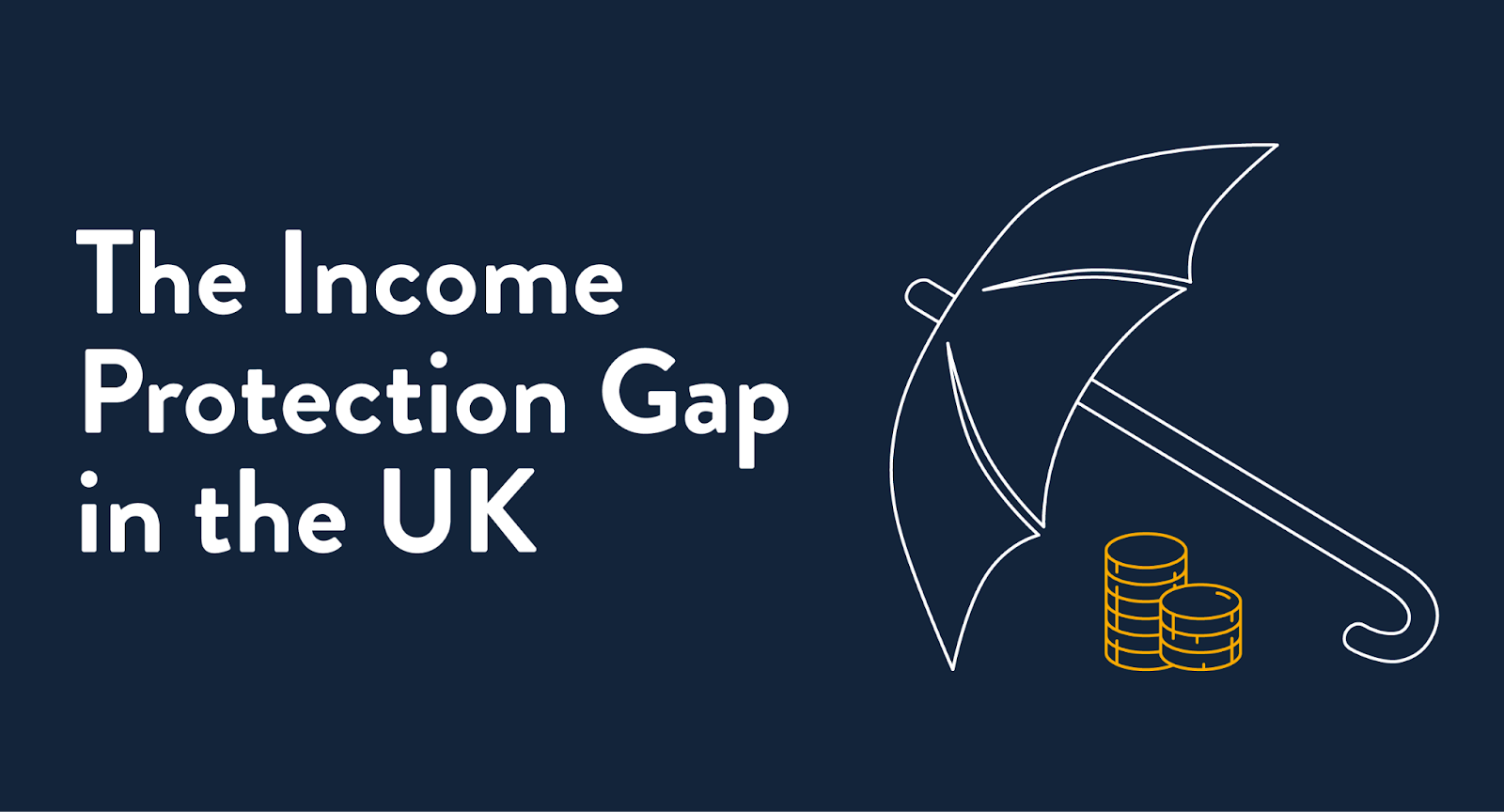
Income protection is a type of insurance that provides you with financial support if you’re unable to work due to illness or injury. Despite this being a way to secure your income if you have any unexpected health problems, only a small number of Brits currently have this insurance in place.
Below, we’ve outlined income protection takeup in the UK, exploring where the gaps are. We’ve also debunked some common misconceptions around the topic and highlighted how this type of cover could benefit you.
Only 14% of Brits have income protection
In a recent survey, we found that only 14% of British adults (less than one in six) have income protection. This means 86% are leaving themselves at risk of not being able to support themselves financially if they find themselves unable to work due to illness or injury.
In comparison, 37% of Brits have life insurance, meaning more people are making end-of-life plans for their loved ones, rather than protecting their current finances from the fallout of a health concern.
Looking at demographic splits, we also found that just 15% of 35-44 year olds have income protection. This demographic is also the most likely age group to have a mortgage, meaning that many homeowners are risking not being able to pay their mortgage instalments should they find themselves unable to work. Whilst some mortgage lenders will have steps in place to help assist you if you’re unable to make your payments, your home could end up being repossessed if an agreement can’t be reached about how you will pay.
Our study also revealed that women are more likely to leave themselves vulnerable to the consequences of not having income protection with just 11% holding this policy compared to 17% of men. This gender disparity could be the result of the gender pay gap which is currently at around 7.7% for full-time workers, and 14.3% for all employees on average.
The pay gap could be leaving women with less disposable income to pay for insurance products such as income protection. The gender disparity revealed in our data could also mean that, in many cases, men are the higher earners in a household; in these instances, the choice to insure the higher income could account for fewer women having income protection in place. Whatever the reason, it’s equally as important for women as it is for men to consider the value of income protection, and how it can prevent them from becoming financially vulnerable if they need to stop working.
Looking at income protection takeup regionally, people in Southampton are the most likely to have taken out income protection insurance (22%), followed by York (20.9%) and Glasgow (20.5%). Shockingly, just 3.2% of Portsmouth residents have income protection, followed closely by Wrexham (3.8%) and Cardiff (4.3%). In the capital, London, 17.3% have income protection.
Almost a third of Brits without income protection regret not taking out this policy
Our survey suggests that income protection is an afterthought for many Brits. Whilst it can be tempting to save money instead of taking out insurance, income protection costs a small amount each month and could massively help you in the long term.
Almost a third (29%) of Brits regretted not taking out income protection insurance. Looking at this by age group, 43% of 25 to 34 year olds and 38% of 35-44 year olds had regrets about not taking this insurance out.
Additionally, 47% of those with income protection said they wished they had taken out the policy sooner, suggesting many came to understand its benefits once they’d taken out the policy.
What are the biggest misconceptions around income protection?
Our income is one of our most important assets. Despite this, our research has shown that the majority of Brits aren’t insuring their income.
Below, we’ve identified some common misconceptions about income protection and explained why they couldn’t be further from the truth.
1. “It’s the same as life insurance”
Reality:
Income protection replaces a percentage of your income if you’re unable to work due to illness or injury. However, life insurance only pays out a lump sum in the event of death, or if the individual has been diagnosed with a terminal illness and has 12 months left to live.
Both protection policies are important, however, income protection is different as it provides ongoing financial support whilst you’re alive but unable to work.
2. “I have sick pay, so I don’t need income protection insurance”
Reality: Whilst employers must pay Statutory Sick Pay to all eligible employees (which is currently £116.75 per week), this is limited to only 28 weeks in total. This amounts to just £3,269, but tax and national insurance will also be deducted from this. For many people, this isn’t enough to cover all of life’s necessary expenses.
Government benefits also exist to help people who are unable to work, but again this might not be enough to fully cover expenses such as rent, mortgage payments, utilities, or shopping bills, for example.
The average monthly wage in the UK is £2,950 before tax and national insurance deductions. If you insured 70% of this, the maximum income cover at Shepherds Friendly, you could take home £2,065 with income protection if you were off work with long-term sickness or injury. This means that if you are on the average UK wage, you could take home up to £24,780 per year, 658% more compared to if you only had Statutory Sick Pay. If you needed to be off work for five years, for example, you could take home up to £123,900 if you were earning the UK average salary.
3. “I have savings I can live off if I’m unable to work”
Reality: Savings will deplete quickly if you find yourself unable to work due to illness or injury. Whilst it’s always good to have an emergency fund, these are best for short-term situations and might not be enough to cover you in the long-term. Our income protection plan allows you to cover yourself up until your chosen retirement age, and you can make multiple claims throughout the term of your plan if you need to stop working on more than one different occasion.
4. “I’m young and healthy, so it’s an unnecessary expense”
Reality: Around 2.8 million people in the UK are economically inactive due to long-term sickness or injury, but age isn’t relative to this. In fact, a recent study in 2024 found that people in their early 20s are more likely to be economically inactive due to ill health than people in their early 40s. Furthermore, 34% of people aged 18-24 have taken time off work in the past year due to poor mental health compared with just 15% of those aged 55 or over.
At Shepherds Friendly, mental health conditions are the second most claimed for health issue by members who have income protection, making it a significant reason for individuals needing to take long-term sick leave from work. The most common reasons are musculoskeletal (non-spinal) issues, followed by spinal issues, fractures, and cancer. Accidents and illnesses can happen at any time and at any age, so it’s always best to be prepared.
Furthermore, your income protection premium could actually be cheaper if you’re young and healthy. Whilst just 9% of those aged 18-24 in our survey have income protection, it’s worth exploring your options as early as possible when you start work to avoid higher costs down the line.
5. “Income protection is an expensive policy”
Reality: As mentioned above, how much you pay for your income protection policy can depend on your age and health. It’s also dependent on your lifestyle, occupation and any current health conditions, however protection can start from as little as £5 a month – which is less than the cost of a streaming subscription, and you can protect up to 70% of your pre-tax salary. For example, with a Shepherds Friendly Income Protection plan, you could receive up to a maximum of £33,600 a year.
Whilst the amount you pay can increase depending on your circumstances, the long-term benefits can be substantial if you find yourself unable to work.
6. “It only covers full-time workers”
Reality: Even if you’re employed on a part-time basis, you’re still eligible for income protection. If your part-time salary is essential to you being able to afford your living expenses, income protection could be extremely beneficial to you in the long run.
If you’re self-employed, you’re also still eligible for income protection cover. Every provider is different, but at Shepherds Friendly we offer self-employed individuals insurance for up to the average of their last three years’ net-profit.
Max Jarrold, Chief Growth Officer at Shepherds Friendly, adds: “Despite most of us relying on our income to pay for essential living expenses, it’s surprising to see how many people in the UK haven’t taken out income protection.
“Income protection will help provide you and your loved ones with a financial safety net if you’re unable to work due to an illness or injury. Accidents and health issues can occur very unexpectedly, and it’s often too late when we think about putting the right protection measures in place.
“In today’s economic climate, many of us prioritise shorter-term financial needs, such as paying off bills or saving for a holiday. As a result, there isn’t a wide understanding of what long-term financial safety nets there are to help prevent you from being unable to pay for necessities if you lose your income due to long-term sickness or injury.
“Besides focusing on short term financial goals, we often prioritise other areas of risk by taking out pet and phone insurance, without considering insuring our income. Seeing as it’s our income that pays for these things, many of us would find ourselves unable to financially fund them if our income was cut off.
“No matter your age, it’s important to consider what the benefits of income protection could mean for you. However, if you own a home, or have a family that depends on you, income protection could be even more vital. If you’re unsure what type of insurance is right for you, you can always speak to a financial advisor to help you plan the best way to prepare for any unforeseen circumstances in the future.”
Methodology
Survey of 2,000 people in the UK aged 18 and over. Survey conducted in July 2024.
To work out what the average worker in the UK could be taking home with income protection compared to Statutory Sick Pay, we took the mean salary from the ONS (table 8.7a) and divided this by 12 to find the average monthly wage. We then calculated 70% of this to reveal what the individual could take home per month with Shepherds Friendly’s income protection. We then multiplied this figure by 12 to find yearly take home with income protection, and this figure by five to find the value over the course of five years.
Information on most commonly claimed conditions has been taken from Shepherds Friendly’s internal database.



